University of Ibadan
The University of Ibadan (UI) is a public research university in Ibadan, Nigeria. The university was founded in 1948 as University College Ibadan, one of many colleges within University of London. It became an independent university in 1963 and is the oldest degree awarding institution in Nigeria.
.png) UI crest | |
Former names | University College Ibadan |
|---|---|
| Motto | "Recte Sapere Fons" (To think straight is the fount of knowledge). |
| Type | Public |
| Established | 1948 |
| Chairman | Nde Joshua Mutka Waklek |
| Chancellor | Saad Abubakar, Sultan of Sokoto |
| Vice-Chancellor | Professor Abel Idowu Olayinka |
| Students | 41,743[1] |
| Location | , , |
| Website | http://www.ui.edu.ng/ |
Through its graduate network, the University of Ibadan has contributed to the political, industrial, economic and cultural development of Nigeria. The history and influence of the University of Ibadan have made it one of the most prestigious universities in Africa.[2][3]
The University of Ibadan is made up 92 academic departments organized into 17 faculties namely: Arts, Science, Basic Medical Sciences, Clinical Sciences, Agriculture, the Social Sciences, Education, Veterinary Medicine, Pharmacy, Technology, Law, Public Health, Dentistry, Economics and Management Sciences, Renewable Natural Resources, Environmental Design and Management, and Multidisciplinary Studies. The Faculties of the Basic Medical Sciences, Clinical Sciences, Public Health and Dentistry are organized as a College of Medicine. The University has other academic units amongst which are: Institute of Child Health, Institute of Education, Institute of African Studies, Centre for Child Adolescent and Mental Health, Centre for Entrepreneurship and Innovation (CEI), Institute for Advanced Medical Research and Training (IAMRAT), Institute of Cardiovascular Diseases, Centre for Drug Discovery, Development & Production (CDDDP) and Centre for Control & Prevention of Zoonosis (CCPZ). The recently established Infectious Diseases Institute (IDI), School of Business (UISB) and National Institute for Maternal, Child & Neonatal Health (NIMCNH) have commenced operation.
The University of Ibadan has 15 halls of residence which provide accommodation for about 30% of the population of students in the regular studies mode, some of the popular halls in the university includes Lord Tedder Hall, Kenneth Mellanby Hall, Sultan Bello Hall, Nnamdi Azikiwe Hall, Independence Hall, Tafawa Balewa Hall, Kuti Hall, Queen Idia Hall, Queen Elizabeth Hall and the Obafemi Awolowo Hall which is the largest female hall in West Africa. The University has a total staff strength of 5,339 with 1,212 housing units for both senior and junior staff. The university has residential and sports facilities for staff and students on campus, as well as separate botanical and zoological gardens.
The university has educated many notable alumni, including a Nobel Laureate in Literature, eminent mathematicians, scientists, politicians, lawyers, business icons, philosophers, writers, monarchs, countless technocrats, recipients of the Nigerian National order of merit, Fellows of the various learned Academies. In September 2016, it became the first Nigerian university to make the top 1000 in Times Higher Education rankings. Prior to that, it had always made the top 10 African Universities in Webometrics Rankings.[4][5]
History
The origins of the university are in the University of London. It was established in 1948 as the University College Ibadan, as a College of the University of London which supervised its academic programmes and awarded degrees until 1967.[6][7] The establishment came as a result of recommendation of the Asquith and the Elliot Commissions on Higher Education in the then British colonies, that two University Colleges of the University of London be set up in Ghana and Nigeria.[8] Prior to 1948, Yaba College had been founded in 1932 in Yaba, Lagos, as the first tertiary educational institute in Nigeria, focused primarily on providing post-secondary vocational education and teacher training to Africans. In 1948, staff and students from Yaba Higher College were transferred to Ibadan to form the new University College Ibadan.[9]
The university college started on 18 January 1948. The sod of its permanent site was cut on 17 November 1948 and became a full-fledged independent university in early 1963.[10]
In late 1963, on the university playing-fields, with a celebration marked by talking drums, the Rt. Hon. Sir Abubakar Tafawa Balewa, first Prime Minister of independent Nigeria, became the first Chancellor of its independent university. The first Nigerian vice-chancellor of the university was Kenneth Dike, after whom the university library is named.[11]
First degree awarding institution in Nigeria
At the time of its establishment as University College Ibadan, students were awarded degrees of the University of London. That makes it the first degree awarding institution in Nigeria.[12] The University of Nigeria Nsukka (UNN) was the first university in Nigeria when it was established as an autonomous and full-fledged university in 1960. UI became autonomous in 1963 and started awarding its own degrees in 1967.[13] unlike the UNN, which started the same three years earlier.
Rankings and reputation
| University rankings | |
|---|---|
| Global – Overall | |
| ARWU World[14] | 901–1000 (2019) |
| THE World[15] | 501–600 (2020) |
| USNWR Global[16] | 733 (2020) |
Administration
The current principal members of the university administration are:[17]
| Office | Holder |
|---|---|
| Visitor | Muhammadu Buhari |
| Pro-Chancellor & Chairman | Nde Joshua Mutka Waklek |
| Chancellor | Sultan Sa'adu Abubakar, 20th Sultan of Sokoto |
| Vice-Chancellor | Professor Abel Idowu Olayinka |
| Deputy Vice-Chancellor (Administration) | Professor Kayode Oyebode Adebowale |
| Deputy Vice-Chancellor (Academic) | Professor Adebola Babatunde Ekanola |
| Deputy Vice-Chancellor (Research, Innovation and Strategic Partnerships) | Professor Olanike Kudirat Adeyemo |
| Registrar | Mrs. Olubunmi Faluyi |
| Bursar | Dr. Michael O. Alatise |
| University Librarian (UL) | Dr Helen O. Komolafe-Opadeji, CLN |
Faculties
- Agriculture and Forestry
- Arts
- Basic Medical Sciences
- Clinical Sciences
- Dentistry
- Education
- Law
- Pharmacy
- Public Health
- Science
- Technology
- The Social Sciences
- Veterinary Medicine
- Renewable natural resources
- Environmental design and management (proposed)
- Economics
In August 2011 Ruqayyah Ahmed Rufa'i, the then Nigerian Minister of Education, announced that the University of Ibadan would host the Nigerian node of the Pan-African University, the Institute of Earth and Life Sciences.[18]
A major arm of the College of Medicine (which comprises the faculties of Basic Medical Sciences, Clinical Sciences, Dentistry and Public Health) is located about five kilometres from the main university, within the structure of The University College Hospital. The college has a dormitory for students who are in their clinical years of study. The college was created in August 1980. Some of the past provosts are Oluwole Akande, Isaac Folorunso Adewole, and Akinyinka Omigbodun.[19]
Institutes
- Institutes of African Studies
- Institute of Child Health
- Institute of Education
- Advanced Medical Research and Training
- Institute for Peace and Strategic Studies
- LES Institute of PAU
Centres of excellence
- Centre For Excellence In Teaching & Learning]
- Centre for Child & Adolescent Mental Health
- Centre for Control & Prevention of Zoonoses
- Center for Drug Discovery, Development and Production (CDDDP)
Affiliate institutions
Below is a list of affiliate institutions of the University of Ibadan, approved by the National Universities Commission (NUC).[21][22]
- Bigard Seminary, Enugu, Enugu, State
- Archbishop Vining College of Theology, Akure
- St Augustine's College of Education Akoka, Lagos
- Osun State College of Education, Ilesa
- Federal College of Education, Osiele, Abeokuta, Ogun State.
- Federal College of Education (Special), Oyo, Oyo State.
- SS Peter And Paul Seminary, Bodija, Ibadan
- Immanuel College of Theology and Christian Education, Samonda, Ibadan
- Dominican Institute, Samonda, Ibadan
- ECWA Theological Seminary, Igbaja
- Nigeria Baptist Theological Seminary, Ogbomoso
- Life Seminary, Ikorodu
- Redeemed Bible College
- UMCA Seminary, Ilorin, Kwara
- Michael Otedola College of Primary Education, Epe Lagos State
Library
Among the notable structures in the university is the central Kenneth Dike Library, located just beside the Faculty of Arts. The library, which has a large capacity for students, contains books relating to virtually all fields of knowledge both in and outside the university community. To ensure its easy access, students are made to carry out their library registration in their first year of admission.[23]
The Library is named after Professor Kenneth Dike who was the first indigenous Principal and former Vice-Chancellor of the school. it was established out of the desires of the founding fathers and matriarch of the institution in order to cut a niche for research and sound teaching.[24] Today, the library is ranked favourably in the comity of libraries in the Commonwealth.[25]
The Library contains 700,000 volumes of information and over 1,250 sears for readers. It is open to all senior staff, students of the institution, senior staff of the University College Hospital, (UCH) Ibadan as well as Alumni of the University. The library will also admit anyone else with cogent reasons be it research, reference purposes, study etc into the library on provision of letter of introduction from a recognized university official i.e. Deal, HOD from the visitor's school or organization.
Students' union

The university allows the participation of students in some decision making. The students' union is headed by a president who wins by majority vote in the elections. All positions in the students' union are contested for.
Recent activities
On 29 May 2017, the management of the school stopped academic activities for undergraduate students. This was as a result of the protest by the student union. The student body were in disagreement with the school authorities over their failure to issue identity cards to the students and the outlaw on some electrical appliances.[26] On 9 June, it was announced that school will be reopened on 20th.[27] The school resumed activities on 2 July.[28]
Vice Chancellors
The vice chancellors since 1947 include:[29]
- Kenneth Mellanby (Principal) - 1947 to 1953
- J. T. Saunders (Principal) - 1953 to 1956
- J. H. Parry (Principal) - 1956 to 1960
- Kenneth Dike (Principal/Vice Chancellor) - 1960 to 1967
- Thomas Adeoye Lambo - 1968 to 1971
- Orishejolomi Thomas - Dec 1972 to Nov 1975
- Tekena Tamuno - Dec 1975 to Nov 1979
- Samson Olajuwon Kokumo Olayide - Dec 1979 to Nov 1983
- Ladipo Ayodeji Banjo (acting) - Nov 1983 to Nov 1984
- Ladipo Ayodeji Banjo - Dec 1984 - Nov 1991
- Allen B. O. O. Oyediran - Dec 1991 to Nov 1995
- Oladosu A. Ojengbede (acting) - Dec 1995 to Mar 1996
- Omoniyi O. Adewoye - Mar 1996 to Sept 2000
- Olufunso O. Olorunsogo (acting) - Mar 2000 to Sept 2000
- Ayodele O. Falase - Sept 2000 to Mar 2004
- Olufemi Bamiro (acting) - Mar 2004 to Nov 2005
- Olufemi Bamiro - Dec 2005 to Nov 2010
- Isaac Folorunso Adewole - Dec 2010 to Nov 2015
- Abel Idowu Olayinka - Dec 2015 to present
Notable alumni
See also Category:University of Ibadan alumni
- Abdulganiyu Abdulrasaq, lawyer, former President of the Nigerian Stock Exchange [30]
- John Omoniyi Abiri, Nigerian academic
- Sadique Abubakar, Nigeria Chief of Air Staff[31]
- Chinua Achebe, novelist, author of Things Fall Apart[32]
- Dapo Lam Adesina, Member of House of Representative for Ibadan North East/South Federal Constituency
- Adiele Afigbo, historian
- J. F. Ade Ajayi, Nigerian historian
- Claude Ake, Professor of Political Economy, international scholar and social crusader
- Stephen Adebanji Akintoye[33]
- Lola Akande, author and academic
- Grace Alele-Williams[34]
- Elechi Amadi[32][35]
- Alexander Animalu, Emeritus Professor, former Director National Mathematical Centre, Abuja
- Emeka Anyaoku, former Commonwealth Secretary-General[36]
- Kayode Are, former National Security Adviser and former Director General of the State Security Service
- Ladipo Ayodeji Banjo, vice chancellor of the University of Ibadan in 1984
- Senator Robert Ajayi Boroffice
- Vivian E. Browne, visual artist[37]
- J. P. Clark[32][35][38]
- Sola David-Borha, Chief Executive (Africa Region) of Standard Bank
- Segun Toyin Dawodu, physician, attorney, academic, and entrepreneur who established the first website[39] on socio-political issues of Nigeria.
- Adebayo Faleti, journalist, poet, actor and writer
- Kayode Fayemi, former Governor of Ekiti State, Min of Solid Minerals
- Chukwuemeka Ike, writer
- Amadi Ikwechegh[40]
- Abiola Irele[41]
- Funmi Iyanda, Nigerian talk show host, broadcaster, journalist
- William Kumuyi, founder and General Superintendent of Deeper Christian Life Ministry[42][43]
- Eyitayo Lambo, Nigerian former Federal Minister of Health
- Mary Lazarus, Nigerian actress.
- Eddie Mbadiwe, Member of the House of Representative
- James Meredith, Civil Rights Movement figure
- Epaphras Denga Ndaitwah[44]
- Adaobi Tricia Nwaubani[45][46]
- Temitope Ogunsemo Nigerian edtech entrepreneur
- Christopher Okigbo[32][35][47]
- Isidore Okpewho
- Tunji Olaopa, founder and Executive Vice-Chairman, ISGPP
- Olufunmilayo Olopade[48][49]
- Sophie Oluwole, philosopher
- Akinyinka Omigbodun[50]
- Michael Omolewa, former President of UNESCO General Conference and Ambassador of Nigeria to UNESCO[51]
- Kole Omotosho[52]
- Gamaliel Onosode[53]
- Zakariyau Oseni
- Femi Osofisan, lecturer and playwright known for Women of Owu
- Niyi Osundare[45]
- Ken Saro-Wiwa[54][55][56]
- Wole Soyinka, winner of the 1986 Nobel Prize in Literature[32][35]
- Martin I. Uhomoibhi[57]
- Farida Waziri[58]
- Folashade Yemi-Esan, head of the civil service of the federation
- Yahaya Kuta, author
Notable faculty

- Beatrice Aboyade, librarian
- Isaac Folorunso Adewole
- Ladipo Ayodeji Banjo, Professor of English
- Ayo Bamgbose, Professor of Linguistics
- Jacob Ade Ajayi, Professor of History[59]
- F. V. Atkinson, mathematician
- Olumbe Bassir, founding member of Biochemistry and Microbiology departments[60]
- Christine Hamill, mathematician
- Molly Mahood, literary scholar
- Olakunbi Olasope, Professor of Classics
- Abel Idowu Olayinka
- Michael Omolewa, Professor of History and Adult Education
- Folake Onayemi, Professor of Classics and Head of the Department of Classics
- Niyi Osundare
- H. F. C. Smith
- Wole Soyinka[61]
- Grace Oladunni Taylor, biochemist, first African to win a L'Oréal-UNESCO Award for Women in Science and second female inducted into the Nigerian Academy of Science
- Fabian Udekwu, Professor of Surgery, first Nigerian cardiothoracic surgeon
- Duncan White
Gallery of infrastructures at the university
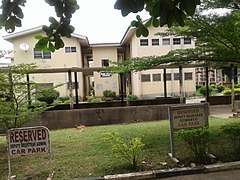 Student Affairs Building
Student Affairs Building Bookshop
Bookshop Trenchard Hall
Trenchard Hall U.I. Hotels
U.I. Hotels UI Tower
UI Tower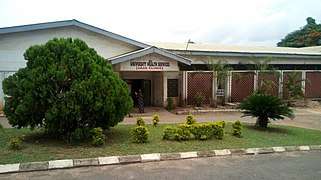 University Health Services Centre
University Health Services Centre Statue of Freedom
Statue of Freedom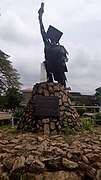 Statue
Statue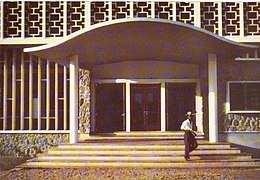 Kenneth Dike Library
Kenneth Dike Library Arts Theatre
Arts Theatre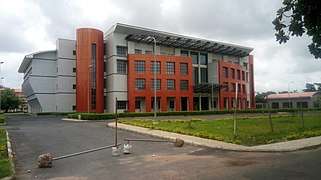 Business School Building
Business School Building Catholic Chapel
Catholic Chapel CBT Centre
CBT Centre Centre for Educational Media Resource Studies building
Centre for Educational Media Resource Studies building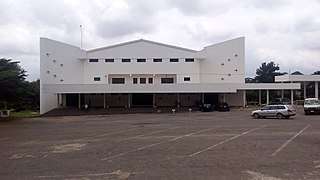 Chapel of the Resurrection
Chapel of the Resurrection Conference Centre
Conference Centre Department of Industrial & Production Engineering
Department of Industrial & Production Engineering%2C_University_of_Ibadan.jpg) Dr. Michael Omolayole Centre (Alumni Centre)
Dr. Michael Omolayole Centre (Alumni Centre) Dr. Emmanuel Egbogah Centre for Petroleum Engineering
Dr. Emmanuel Egbogah Centre for Petroleum Engineering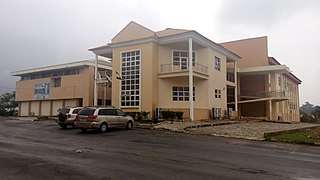 Engineering Laboratory Complex, Faculty of Technology
Engineering Laboratory Complex, Faculty of Technology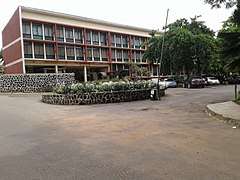 Faculty of Arts
Faculty of Arts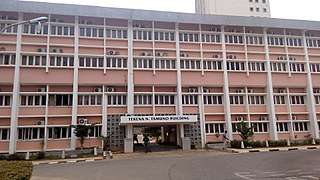 Front view of the Tekena Tamuno Building
Front view of the Tekena Tamuno Building Gamaliel Onosode Park
Gamaliel Onosode Park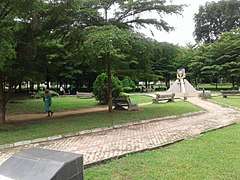 Heritage Park
Heritage Park Kuti Hall
Kuti Hall Lawn tennis court
Lawn tennis court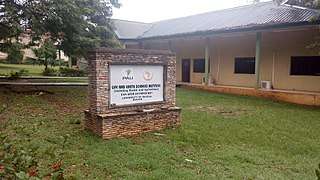 Life and Earth Sciences Institute, Pan African University
Life and Earth Sciences Institute, Pan African University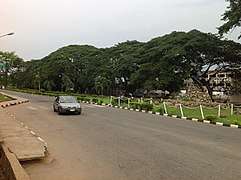 Main road from the first gate
Main road from the first gate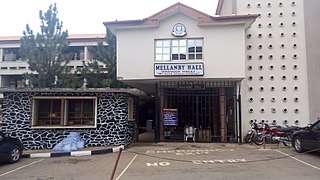 Mellanby Hall
Mellanby Hall National Archives of Nigeria
National Archives of Nigeria Office of International Programmes
Office of International Programmes School of Business
School of Business Post Graduate School
Post Graduate School
Notes
- Oyedele, Damilola (8 September 2013). "UI Receives Biggest Allocation of Intervention Funds". Archived from the original on 16 December 2014. Retrieved 19 October 2014.
- Teferra et al. 2003, pp. 492–99.
- Van den Berghe 1973, p. 15.
- Agarin, Williams E. Nwagwu and Omoverere. "Nigerian University Websites: A Webometric Analysis". www.webology.org. Retrieved 30 May 2020.
- "Africa | Ranking Web of Universities: Webometrics ranks 30000 institutions". www.webometrics.info. Retrieved 30 May 2020.
- "History: Department of Medicine". UI Archive. University of Ibadan. Retrieved 26 May 2019.
- "History: University of Ibadan". 27 February 2018.
- "Establishment of the University". 27 February 2018.
- Nkulu, Kiluba L. (2005). Serving the Common Good: an African perspective on higher education. Peter Lang. p. 54. ISBN 0-8204-7626-9.CS1 maint: ref=harv (link)
- "History of UI | UNIVERSITY OF IBADAN". www.ui.edu.ng. Retrieved 30 May 2020.
- Livsey, Tim (2017), Livsey, Tim (ed.), "Introduction: Nigeria's University Age", Nigeria’s University Age: Reframing Decolonisation and Development, Cambridge Imperial and Post-Colonial Studies Series, Palgrave Macmillan UK, pp. 1–18, doi:10.1057/978-1-137-56505-1_1, ISBN 978-1-137-56505-1, retrieved 26 May 2020
- Amoo, Abdussalam. "University of Ibadan is NOT the first university in Nigeria". EduCeleb.com. EduCeleb. Retrieved 26 May 2019.
- "History: Department of Medicine". UI Archive. UI. Retrieved 26 May 2019.
- "Academic Ranking of World Universities 2019 - University of Ibadan". ShanghaiRanking. Retrieved 2 January 2020.
- "World University Rankings 2020 - University of Ibadan". Times Higher Education (THE). Retrieved 18 September 2019.
- "U.S. News Education: Best Global Universities 2020 - University of Ibadan". U.S. News & World Report. Retrieved 18 September 2019.
- "University of Ibadan Principal Officers | UNIVERSITY OF IBADAN(UI)". Ui.edu.ng. Retrieved 5 July 2010.
- "PAN AFRICAN UNIVERSITY TO BE LOCATED IN UNIVERSITY OF IBADAN…AU". Education Matters. 10 August 2011. Retrieved 1 December 2011.
- "College of Medicine, University of Ibadan, Nigeria". Retrieved 17 December 2016.
- "Home | UNIVERSITY OF IBADAN". www.ui.edu.ng. Retrieved 7 February 2020.
- "Approved Affiliations". www.nuc.edu.ng. National Universities Commission. Retrieved 19 May 2020.
- "UI Affiliated Institutions Post UTME & DE Form, 2018/2019". Latest Nigerian University and Polytechnic News. 13 August 2018. Retrieved 7 February 2020.
- "REGISTRATION – Kenneth Dike Library". Retrieved 30 May 2020.
- "The Library | UNIVERSITY OF IBADAN". www.ui.edu.ng. Retrieved 26 May 2020.
- "Kenneth Dike Library - Kenneth Dike Library". Retrieved 30 May 2020.
- "[BREAKING] UI shut down, students to vacate campus by 6pm".
- "University of Ibadan reopens 20 June". 9 June 2016.
- "University of Ibadan Reopens 2 July, Exams Begin 4 July - NTA.ng - Breaking News, Nigeria, Africa, Worldwide". www.nta.ng.
- "Vice Chancellors | UNIVERSITY OF IBADAN". www.ui.edu.ng. Retrieved 19 May 2020.
- https://www.nigerianmuse.com/20140310181501zg/nigeria-watch/profile-abdul-ganiyu-folorunsho-abdul-razaq/
- Badru, Adeola (23 July 2019). "Nigeria: Boko Haram Insurgency Substantially Degraded - CAS". allAfrica.com. Retrieved 19 May 2020.
- July, Robert W (1987). An African Voice. Durham (NC): Duke University Press. ISBN 978-0-8223-0769-3. p. 64.
- "Africultures - Biographie de Stephen Adebanji Akintoye". africultures.com (in French). Retrieved 21 November 2010.
- "AMU CHMA NEWSLETTER #12 (03/27/1994)". math.buffalo.edu. Retrieved 26 February 2011.
- Laurence, Margaret (2001). Long Drums and Cannons: Nigerian Dramatists and Novelists, 1952-1966. Alberta: University of Alberta Press. ISBN 978-0-88864-332-2. p. viii.
- "Emeka Anyaoku - Imo State Investment Summit". imoinvestmentsummit.com. Retrieved 28 October 2010.
- "Vivian E. Browne CV". The Crows Nest Studio. Retrieved 5 March 2016.
- "African Success: Biography of John Pepper Clark". 4 May 2009. Retrieved 6 July 2010.
- DAWODU.COM, http://www.dawodu.com
- "The Life and Times of Amadi Ikwechegh". Retrieved 6 July 2010.
- Wumi Raji (14 February 2007). "Churchill College Celebrates Abiola Irele". Archived from the original on 14 September 2012. Retrieved 6 July 2010.
- "Kumuyi: tomorrow belongs to Africa". Farmington Hills, Michigan, USA: The Gale Group. 1 August 2006. Retrieved 27 February 2011.
- Fasehun, McNezer (13 April 2009). "Of Private Jets and Lot's Wives". AllAfrica.com. AllAfrica Global Media. Retrieved 27 February 2011.
- Ndjebela, Toivo (25 January 2011). "NDF hails new chief". New Era. Archived from the original on 11 January 2013. Retrieved 25 January 2011.
- "Niyi Osundare at 60 Literary Fete". 4 February 2007. Retrieved 6 July 2010.
- "Nwaubani, author"I do not come to you by chance" wins Commonwealth Writers' Prize". CP Africa.
- "C. Okigbo 1932–1967". Christopher Okigbo Foundation. Archived from the original on 6 February 2010. Retrieved 6 July 2010.
- "Olufunmilayo I. Olopade". AACR. American Association for Cancer Research. 2001. Archived from the original on 29 September 2013. Retrieved 6 June 2013.
- Adegun, Aanu. "Dr. Olufunmilayo Olopade, Nigeria's gift to the medical world". Saturday Newswatch. Retrieved 28 July 2013.
- "Aakinyinka O. Omigbodun". University of Ibadan. Retrieved 15 September 2015.
- "Michael Abiola Omolewa to preside over General Conference". UNESCO. Retrieved 4 September 2012.
- "Kole Omotoso". Retrieved 6 July 2010.
- David Diai (20 July 2008). "Gamaliel Onosode: Ways Of Mr Integrity At 75". The Guardian. Nigeria. Retrieved 6 July 2010.
- Boyle, Catherine (26 May 2009). "Portrait: Ken Saro-Wiwa". The Times. Wapping, London, UK: News Corporation. Retrieved 28 February 2011.
- "Nigerian expat sees us with fresh eyes". Canada.com. Toronto, Canada: Postmedia Network Inc. 27 April 2008. Retrieved 28 February 2011.
- "Ken Saro-Wiwa | Nigerian author and activist". Encyclopedia Britannica. Retrieved 19 May 2020.
- "Biographical Note on Martin Ihoeghian Uhomoibhi President of Human Rights Council for 2008–2009" (Press release). Human Rights Council. 19 June 2008. Retrieved 6 July 2010.
- "Executive Chairman, EFCC". Economic and Financial Crimes Commission. 11 June 2008. Archived from the original on 20 October 2009. Retrieved 25 September 2009.
- "SOAS Honorary Fellows: Professor Jacob F. Ade Ajayi". soas.ac.uk. Retrieved 8 June 2011.
- "Professor Olumbe Bassir". archivesofibadanmedicine.com. Retrieved 8 June 2011.
- "Nobel Laureate Wole Soyinka Joins LMU". lmu.edu. Archived from the original on 11 February 2009. Retrieved 10 October 2010.
References
- Damtew Teferra; et al. (2003). African Higher Education: An International Reference Handbook. Indiana University Press. ISBN 978-0-253-34186-0.
Further reading
- Tekena Tamuno (1981). Ibadan Voices: Ibadan University in Transition. Ibadan University Press. ISBN 978-978-121-109-6.